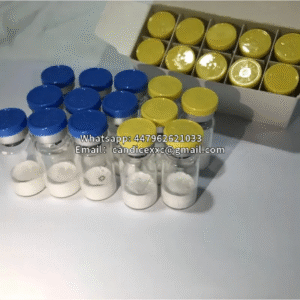
GHK-Cu 50mg
GHK-Cu 50mg: Explore the Natural Peptide’s Potential
GHK-Cu 50mg is a premium research-grade peptide designed for scientific exploration. As a smaller dosage option, it offers flexibility for studies requiring precise measurements, making it a top choice for researchers delving into the properties of this naturally occurring compound.
What Makes GHK-Cu Unique?
GHK-Cu is a tripeptide (glycyl-L-histidyl-L-lysine) bound to a copper ion, found in human blood, saliva, and urine. Its levels decline with age—from 200 ng/ml in young adults to 80 ng/ml by 60—fueling interest in its role in aging and tissue repair. This 50mg formulation lets researchers test its effects in controlled, lower-dose scenarios.
Core Biological Benefits
Skin Health & Repair
- Collagen Boost: Stimulates collagen and glycosaminoglycan production, critical for skin structure and wound healing.
- Antioxidant Action: Fights free radicals, reducing oxidative stress linked to aging and cell damage.
- Anti-Inflammatory Support: Calms inflammation, aiding recovery from skin irritation or injury.
-

GHK-Cu price
Beyond Skin: Immune & Vascular Health
Studies show GHK-Cu enhances immune cell activity, drawing them to injury sites. It also promotes blood vessel growth, vital for healing burns or slow-healing wounds.
Research Uses
- Cosmetic Science: Ideal for testing anti-aging claims—improving elasticity, reducing wrinkles, and evening tone.
- Medical Research: Explored for diabetic ulcers and ischemic wounds, with data linking it to faster closure and lower infection rates.
- Neuroscience: Investigated for neuroprotective effects, including supporting neuron function and reducing brain inflammation.
Produkbesonderhede
Each vial contains 50mg of lyophilized GHK-Cu powder (≥98% pure). Requires reconstitution with bacteriostatic water (not included). For laboratory use only.
GHK-Cu 50mg offers researchers a versatile tool to unlock insights in skincare, medicine, and neuroscience. Its natural origin and multifaceted benefits make it a key compound in modern research.
Los jou boodskap

